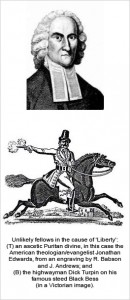MONTHLY BLOG 43, MIS-SPEAKING …AND HOW TO RESPOND
If citing, please kindly acknowledge copyright © Penelope J. Corfield (2014)
When we talk for a living and don’t do it to a written script, there’s always a chance of getting the words wrong. Mostly it doesn’t matter. Phrases can be rephrased, self-corrections swiftly made. The sentences flow on and listeners hardly notice. Yet sometimes a sudden silence tells the speaker that a blunder or infelicity has been noted. Funnily enough, I remember a few times when I’ve felt that sudden frigidity in the atmosphere, but can hardly remember exactly what I said wrong. So my attempt at a confessional is somewhat thwarted by the human capacity for benign forgetting.
For many years now, I have adopted the policy of giving all my lectures and talks from notes. They are sometimes written and detailed, sometimes just in my head. There’s always a structure, often threefold. I began that policy when one of my old friends protested that he was disappointed when I lectured from a fully written script. (Strangely, when I next heard him lecture, he too had a written text). But there’s no doubt that such a practice is much more boring than free-speech. So I threw away my scripts and launched into freedom. It was nerve-wracking at first but then became really good fun. I now positively enjoy lecturing, because free-speaking requires a great mix of relaxation and concentration, which really keeps one mentally on one’s toes. Talk about living in the here-and-now. But, as already admitted, there’s always a chance of mis-speaking.
The quickest response to a blunder is a quick admission, ‘No, that came out wrongly’ or ‘No, forget that: let me put the point a better way’. Another option is a self-deprecating joke. That’s generally the best way, thawing the atmosphere and making room for a revised statement. Alas, however, the appropriate quips don’t always come to mind immediately. How often does one wake in the middle of the night with the perfect riposte, which had proved elusive during the daylight hours?
(The answer to that rhetorical question is actually: not that much, since I generally sleep soundly. But sometimes …)
In fact, I often mull over conversations after the event, thinking of what was said or unsaid. It’s one way of understanding my partner in life, who is a keep-his-cards-close-to-his-chest sort of person. I appreciate that, since I have the same trait, under an outward show of chattiness.
Anyway, in the course of mulling over my contributions to asking questions in academic seminars, I am aware that there’s a fine line between jokes and jibes that work, and those that don’t. My aim is to make some genial general observation, which is intended to open up the wider implications of the question in hand, before honing in on a specific query. Doesn’t always work, but that’s my aim. It’s not a tactic that I recommend to beginners in academic life; but something that I require of myself as a comparative senior.
On one occasion, I made a sharp remark about the panel of speakers, who were enthusing over historic riots. My aim was to tease them about the contrast between their academic respectability and their admiration for lawlessness (if in a good cause). It was the precursor to my question, not the major point. But anyway, it went down like the proverbial lead balloon. Made me seem to be avoiding engagement with the issues at stake – just the reverse of my intention.
These particular panellists reminded me somewhat of my late uncle, Christopher Hill, the eminent Marxist historian.1 He loved historic outlaws, pirates, highwaymen, and vagrants, as well as earnest seventeenth-century Puritans, who challenged the unquestioning authority of traditional religious teaching in an era when it was difficult to do so. In fact, Hill wrote a book about them, entitled Liberty against the Law (1996) which aptly expressed his appreciation.2 The fact that the worthy Puritans of whom he wrote approvingly would have hated the irreligious and a-religious outlaws with whom they were yoked did not trouble him. From his virtuous life of laborious and enjoyable study, Hill enjoyed the raffish life of the outlaws vicariously. And why not? Many of us have mixtures of Puritanism and libertinage within us. I was too hard on him, in my thoughts; and needlessly sardonic with my colleagues.
 So what should I have done? Worded my point in a more felicitous way, which I would have done, if writing. Or deleted my little joke at their expense? Probably the latter. I was playing the footballers and not the ball. Breaking my own rules for seminar questions. (The point might not be amiss in a review where viewpoints can be explained more fully.) So the occasion – and the disapproving silence from the audience – has taught me something useful for the future.
So what should I have done? Worded my point in a more felicitous way, which I would have done, if writing. Or deleted my little joke at their expense? Probably the latter. I was playing the footballers and not the ball. Breaking my own rules for seminar questions. (The point might not be amiss in a review where viewpoints can be explained more fully.) So the occasion – and the disapproving silence from the audience – has taught me something useful for the future.
Lastly, a chance to record a fine response to another example of mis-speaking, this time not by me. The occasion was the book launch of F.M.L. (Michael) Thompson’s urban history of Hampstead (1974).3 The Mayor of Camden had been asked by the publisher to make a suitable speech. That he did, before ending, ungraciously: ‘But I shan’t read this book’. Probably he didn’t mean to be so rude. Perhaps he really meant something like: ‘But I fear that this volume may be a bit too learned for me …’. Either way, his remark did not meet the moment. It seemed to express a traditional and unhelpful strand of anti-intellectualism in the working-class Labour movement. (Not the entire story, of course, since there is another strand that values engagement with learning and adult education).
Be that as it may, I still remember Mike Thompson’s lungeing riposte, at the end of his gracious speech in reply. Having thanked his wife, publisher and friends, he then thanked the Mayor in his civic capacity: ‘But I shan’t vote for you’.
Well done, Mike. I hope not to mis-speak again. Yet, if it happens accidentally, I hope that I get as neat a riposte.
1 For more on Christopher Hill (1912-2003) see P.J. Corfield, ‘“We are All One in the Eyes of the Lord”: Christopher Hill and the Historical Meanings of Radical Religion’, History Workshop Journal, 58 (2004), pp. 110-27; and within PJC website as Pdf/5.
2 C. Hill, Liberty against the Law: Some Seventeenth-Century Controversies (Penguin: London, 1996).
3 F.M.L. Thompson, Hampstead: Building a Borough, 1650-1964 (Routledge: London, 1974).
For further discussion, see Twitter
To read other discussion-points, please click here
To download Monthly Blog 43 please click here


